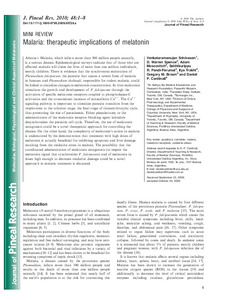Please use this identifier to cite or link to this item:
https://repositorio.uca.edu.ar/handle/123456789/1664| Título: | Malaria : therapeutic implications of melatonin | Autor: | Srinivasan, Venkataramanujan Spence, David Warren Moscovitch, Adam Pandi Perumal, Seithikurippu R. Trakht, Ilya Brown, Gregory M. Cardinali, Daniel Pedro |
Palabras clave: | MALARIA; RECEPTORES DE MELATONINA; APOPTOSIS; ESTRES OXIDATIVO; APLICACIONES TERAPEUTICAS | Fecha de publicación: | 2010 | Editorial: | Wiley | Cita: | Srinivasan, V., et al. Malaria: therapeutic implications of melatonin [en línea]. Journal of Pineal Research. 2010, 48 (1). doi:10.1111/j.1600-079X.2009.00728.x. Disponible en: https://repositorio.uca.edu.ar/handle/123456789/1664 | Resumen: | Abstract: Malaria, which infects more than 300 million people annually, is a serious disease. Epidemiological surveys indicate that of those who are affected, malaria will claim the lives of more than one million individuals, mostly children. There is evidence that the synchronous maturation of Plasmodium falciparum, the parasite that causes a severe form of malaria in humans and P. chabaudi, responsible for rodent malaria, could be linked to circadian changes in melatonin concentration. In vitro melatonin stimulates the growth and development of P. falciparum through the activation of specific melatonin receptors coupled to phospholipase-C activation and the concomitant increase of intracellular Ca2+. The Ca2+ signaling pathway is important to stimulate parasite transition from the trophozoite to the schizont stage, the final stage of intraerythrocytic cycle, thus promoting the rise of parasitemia. Either pinealectomy or the administration of the melatonin receptor blocking agent luzindole desynchronizes the parasitic cell cycle. Therefore the use of melatonin antagonists could be a novel therapeutic approach for controlling the disease. On the other hand, the complexity of melatonin’s action in malaria is underscored by the demonstration that treatment with high doses of melatonin is actually beneficial for inhibiting apoptosis and liver damage resulting from the oxidative stress in malaria. The possibility that the coordinated administration of melatonin antagonists (to impair the melatonin signal that synchronizes P. falciparum) and of melatonin in doses high enough to decrease oxidative damage could be a novel approach in malaria treatment is discussed. | URI: | https://repositorio.uca.edu.ar/handle/123456789/1664 | ISSN: | 1600-079X (online) | Disciplina: | MEDICINA | DOI: | 10.1111/j.1600-079X.2009.00728.x | Derechos: | Acceso Abierto | Fuente: | Journal of Pineal Research. 2010, 48 (1) |
| Appears in Collections: | Artículos |
Files in This Item:
| File | Description | Size | Format | |
|---|---|---|---|---|
| malaria-therapeutic-implications-melatonin.pdf | 365,39 kB | Adobe PDF |  View/Open |
Page view(s)
149
checked on Apr 30, 2024
Download(s)
189
checked on Apr 30, 2024
Google ScholarTM
Check
Altmetric
Altmetric
This item is licensed under a Creative Commons License

